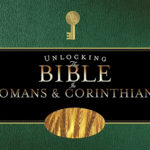
Justification
Romans 3:19–31
19 Now we know that whatever the law says it speaks to those who are under the law, so that every mouth may be stopped, and the whole world may be held accountable to God. 20 For by works of the law no human being will be justified in his sight, since through the law comes knowledge of sin.
The Righteousness of God Through Faith
21 But now the righteousness of God has been manifested apart from the law, although the Law and the Prophets bear witness to it—22 the righteousness of God through faith in Jesus Christ for all who believe. For there is no distinction: 23 for all have sinned and fall short of the glory of God, 24 and are justified by his grace as a gift, through the redemption that is in Christ Jesus, 25 whom God put forward as a propitiation by his blood, to be received by faith. This was to show God’s righteousness, because in his divine forbearance he had passed over former sins. 26 It was to show his righteousness at the present time, so that he might be just and the justifier of the one who has faith in Jesus.
27 Then what becomes of our boasting? It is excluded. By what kind of law? By a law of works? No, but by the law of faith. 28 For we hold that one is justified by faith apart from works of the law. 29 Or is God the God of Jews only? Is he not the God of Gentiles also? Yes, of Gentiles also, 30 since God is one—who will justify the circumcised by faith and the uncircumcised through faith. 31 Do we then overthrow the law by this faith? By no means! On the contrary, we uphold the law.
(ESV)
LanjutWe have seen that the wrath of God is revealed against sin and that Christ rescues us through the gospel. What did this mean for Jesus? And what does it mean for us? In many of our sessions, we focus on an single chapter of the Bible, but today we are going to focus on just four words that are found together in Romans 3: propitiation, redemption, justified, and faith. If this feels daunting to you, hang in there. What you are about to discover is life-giving.
The first time I visited America, I was taken by a friend to see a game of baseball. My friend started talking about sliders, splitters, curveballs, and changeups. I didn’t have the faintest idea of what he was talking about.
Sports have their own distinctive vocabulary. People who love baseball learn the baseball words. People who love Jesus learn the Bible words, and they find joy in what they convey. In this session we will learn four Bible words that will bring us great joy.
For all have sinned and fall short of the glory of God, and are justified by his grace as a gift, through the redemption that is in Christ Jesus, whom God put forward as a propitiation by his blood, to be received by faith. (Romans 3:23–25)
Let me introduce you to Neil and Sally. Neil was in his early twenties when he began dating Sally, an attractive girl he met at the office. He had a reputation for being “a bit on the wild side,” and there were times when Sally was uncomfortable with him.
One night, Neil took Sally to a party where things got a little out of hand. Neil began drinking, and by the time they drove home in the early hours of the morning, he was scarcely able to control the car. Neil drove in a blurry haze until the unthinkable happened. The car hit a bank, careened out of control, and rolled over several times. When the vehicle came to rest, both Neil and Sally were unconscious.
Several hours later, Neil came around in the hospital. His head was thumping, and his body ached as he tried to remember what happened.
“How is Sally?” he asked.
“It’s bad news,” the doctor said. “She’s paralyzed. She won’t ever walk again.”
“Can I see her?”
“No, she will not talk to you.”
Suddenly Neil was in a walking nightmare, and it wasn’t long before he received a letter from Sally’s lawyer. In the light of her permanent disability, Sally was bringing legal action.
Neil lies in the hospital wondering how he could have been such a fool, and how one simple action could have landed him in a situation with such desperate long-term consequences. It was just one night, but it changed everything. Neil wonders how he can live with himself, and he has no idea what to do about Sally.
There are three factors in this situation: First, there is an offense. Neil acted recklessly and irresponsibly when he decided to drive home after drinking. Second, there is an offended person. Sally is angry, and rightly so. Third, there is an offender. Neil knows he is to blame. He is deeply sorry for what he has done, but that won’t change the fact that Sally is paralyzed and that her lawyers are preparing to take legal action against him.
Neil hires a lawyer, and his lawyer talks to Sally’s lawyer about what it would take to settle the case. Their discussion centers on one issue: What will it take to satisfy Sally? The issue is not what Neil thinks is appropriate. It’s all about Sally, because she is the offended party.
Suppose that the lawyers identify a sum of money that would be acceptable to Sally. The payment of that money would be “a propitiation.” A propitiation is a payment offered to placate the anger of the offended party and to satisfy the need for justice so that the case is settled and cannot be raised in a court of law again.
Since our sin is an offense against God, it follows that God is the one who determines what the propitiation should be. The question is “What will satisfy God?”
And the Bible gives us the answer: “Christ Jesus, whom God put forward as a propitiation by his blood, to be received by faith” (Romans 3:24–25). God presents His Son, Jesus Christ, as the propitiation. His death on the cross satisfies God and placates His anger toward our sin.
The God whose holiness we have offended, whose world we have spoiled, and whose wrath we have incurred, sent His one and only Son. God became a man in Jesus Christ and bore His own wrath.
“The Redemption That Is in Christ Jesus”
To redeem is to purchase by the payment of a price. I learned this Bible word as a child through a simple story that has stayed with me. It’s the story of a boy who liked to make things.
One day the boy’s father said to him, “Why don’t you make a boat?” The boy loved that idea, so he worked with his father to make a beautiful sailing boat. He painted it blue and red, and it had a tall white sail. When it was finished, the boy put a special mark on the boat so that he would always know that it was his.
The boy loved his boat, and he had great joy when he took it out to sail on the lake. But one day the boat was caught in a great wind that took it away. The boy was brokenhearted.
Sometime later, the boy was walking past a toy shop in the town when he saw a beautiful boat in the window. It was blue and red, and it had a tall white sail. And when the boy looked closer, he could see the special mark he had put on it so he would always know it was his.
The boy went home, gathered all the money he had saved, and went back to the shop and bought the boat. On the way home, he hugged the boat and he said, “You are twice mine! You are mine because I made you, and you’re mine because I bought you!”
That is what Jesus Christ can say to you and me! “You’re twice mine. You’re mine because I made you, and you’re mine because I bought you.” That is what it means to be redeemed. You are bought by Jesus Christ through the shedding of His blood (1 Peter 1:18–19).
“Justified by His Grace”
Justified is a legal term. It means that a person is declared righteous. Justification is a verdict passed by a judge. Every person will one day stand trial before almighty God, and in every case He will pronounce one of two outcomes: justified or condemned.
Justified is a word that belongs to the last day, but the Bible speaks here about justification in the present tense: “All have sinned and fall short of the glory of God and are justified by his grace” (Romans 3:23–24). God is saying to us, “Your case can be dealt with now! You don’t need to spend your whole life wondering what God’s final judgment about you will be. You can be justified, pronounced not guilty, today!”
The basis on which you can be justified is what Jesus has done for you when He died on the cross. He bore the wrath (propitiation), and He paid the price (redemption).
When God justifies us, He does two things: First, God charges our sins to Jesus, counting them against Him. And second, God credits the righteousness of Jesus to us.
When Karen and I were married, my parents paid for a week at a classy hotel in the Lake District of England. There were no charges for us because the cost was absorbed by someone else. God justifies us freely by charging our sins to Jesus. This gift is ours because the charges we have incurred have been assumed and paid by Jesus.
Then God credits us with the righteousness of Jesus.
Some time ago, I decided to close a credit card account that I had used over several years in Britain. When I called, the representative seemed surprised. “Do you realize that you have 2,000 points on this card?” she asked.
“Can I give these points to someone else,” I asked. “Oh, yes,” she said, “anyone else who has the same card.” I gave them to my father, and he enjoyed the benefits of 2,000 points that he never earned.
When you come to faith in Jesus Christ, God credits His righteousness to you. He justifies you, not because of your performance in the Christian life, but because the righteousness of Christ becomes yours.
“Received by Faith”
Since the only basis for justification is what Jesus accomplished in His death and resurrection, it follows that God will justify those who belong to Jesus.
All have sinned and fall short of the glory of God, and are justified by his grace as a gift, through the redemption that is in Christ Jesus, whom God put forward as a propitiation by his blood, to be received by faith. (Romans 3:23–25)
Notice that faith is the means by which Jesus becomes yours.
Imagine a young couple; we’ll call them Tom and Mary. They meet on a blind date and feel rather awkward as they make polite conversation. But over time, they come to know one another better and their relationship deepens.
One evening, Tom pops the question, and a few months later, Mary is walking up the aisle. The pastor turns to Tom and asks: “Tom, will you have Mary to be your lawful, wedded wife?” Tom says that he will.
Faith is like a marriage in which you are united with Jesus Christ. Think of what being joined to you meant for Jesus: the Holy Son of God had to take your sin as if it were His own. But now think of what being joined to Jesus means for you: you possess the righteousness of Christ as if it were your own!
When you come to faith in the Lord Jesus Christ, all that He accomplished on the cross becomes active in your own experience. And at that moment God declares you “justified.”
Opened
God justifies sinners on the basis of the propitiation that was offered by Jesus on the cross. He does this for all who will come to Jesus in faith. Faith unites a person with Christ who redeems us by paying our debt and crediting us with His righteousness. Justification does not depend on your performance in the Christian life but on Jesus, and all that He accomplished, being yours.
- What did you find most helpful in this session? What did you find most difficult?
- In your own words, what is a “propitiation”?
- Can you think of a time when someone made a sacrifice in order to help you? What does “redemption” tell you about Jesus’ love for you?
- What difference would it make to your life now if you knew what God’s final judgment about you would be?
- Faith involves a commitment to Jesus Christ. Why would you be drawn to this commitment? What might hold you back?
Free Resources


Paid Resources





